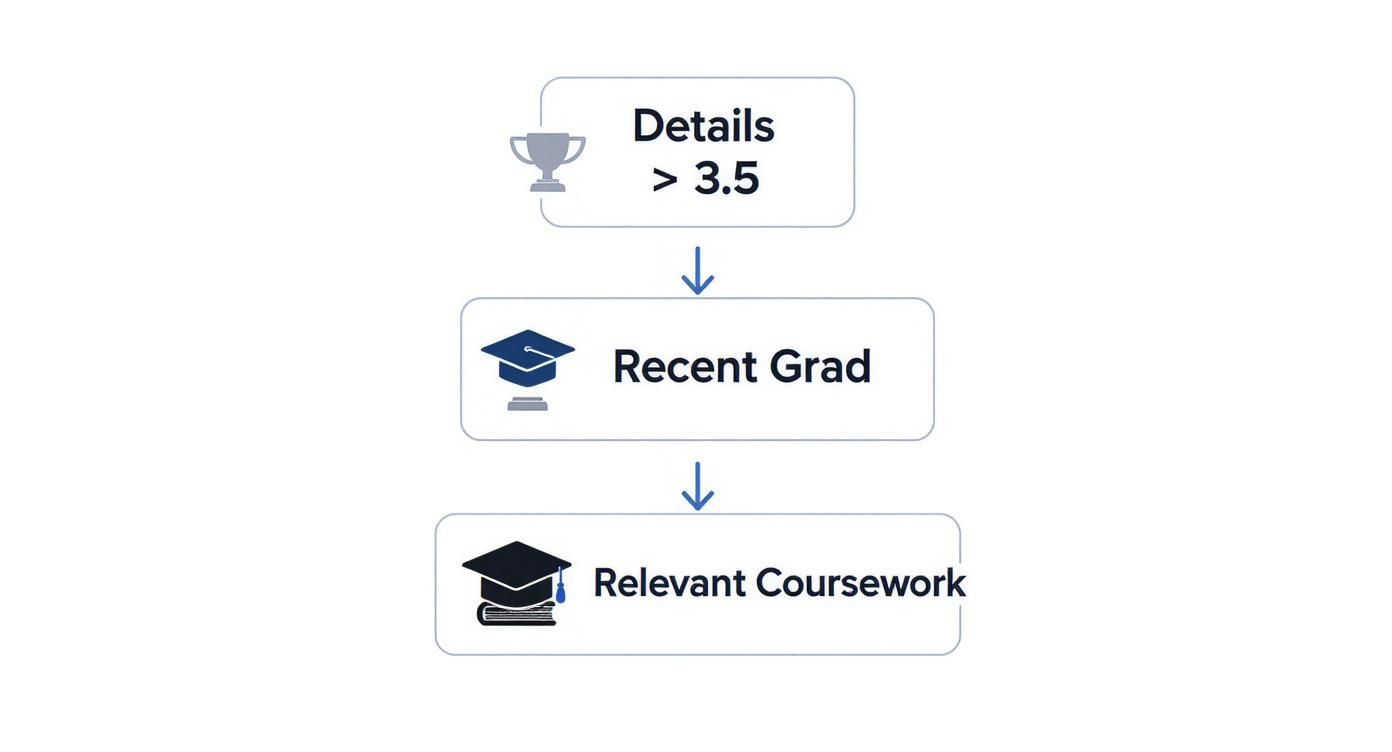How to List Education on a Resume
Your resume’s education section isn't just a formality anymore—it’s a powerful tool to frame your entire professional story. How you present your academic background, whether it’s a traditional degree, a series of online courses, or specialized certifications, can make or break your first impression. It’s your chance to prove your value before a recruiter even gets to your work history.
Why Your Resume's Education Section Matters More Than Ever
In the old days, the education section was a simple checkbox for hiring managers. Got the degree? Check. Moving on.
That’s completely changed. With the rise of skills-based hiring, employers are digging deeper. They want tangible proof of what you can do, not just a piece of paper that says you sat in a classroom.
Your education section is now prime real estate to show you're a perfect match for the job. It's where you connect the dots between what you learned and what you can deliver. For new grads, this is often the most important part of their resume. If that's you, check out our guide on https://www.eztrackr.app/blog/how-to-find-a-job-after-graduation for more tips on navigating this stage.
The Shift Away From Old-School Metrics
The biggest change? Traditional academic metrics are losing their grip. What recruiters look for on a resume has transformed over the last five years, with far less weight placed on things like GPA.
Back in 2019, roughly 73% of employers used GPA as a screening tool. Fast forward to 2024, and that number has plummeted to just 38%. This isn't just a minor tweak; it’s a seismic shift in hiring philosophy. Recruiters have realized that high grades don't always translate to high performance on the job.
This trend points to a bigger movement. Companies now care more about:
- Relevant Coursework: Specific classes that are directly tied to the job’s responsibilities.
- Hands-on Projects: A thesis, capstone, or major academic assignment that shows you can apply what you’ve learned.
- Specialized Certifications: Credentials that prove you're proficient in a specific tool, software, or methodology.
To really make your education section pop, it’s smart to know which certifications employers actually care about. Getting some good certifications that boost career prospects can show you're ready to add value from day one.
Don't Forget the Robots: Optimizing for ATS
Before a human ever sees your resume, it has to get past the gatekeepers: Applicant Tracking Systems (ATS). These are the software programs that scan your application for keywords and formatting. Mess this up, and your resume could land in the digital trash can without a second glance.
Here's a peek at what an ATS dashboard looks like.

As you can see, the system is designed to pull out key pieces of information. That’s why your degree, university, and dates need to be in a standard, easy-to-read format. Trying to get fancy with abbreviations or a creative layout will only confuse the software.
To give you a quick cheat sheet, here’s a breakdown of how to approach your education section based on where you are in your career.
Education on a Resume At a Glance
| Career Level | What to Include | Placement on Resume |
|---|---|---|
| Student / Recent Grad | Degree, University, Graduation Date, GPA (if high), Relevant Coursework, Honors, Projects | Top of the resume, right after your summary/objective. |
| Mid-Career Professional | Degree, University, Graduation Year (optional) | After your professional experience section. |
| Career Changer | Degree, University, Recent Certifications, Relevant Training, Transferable Coursework | Depends on relevance. If new certifications are key, place it higher. |
This table should help you quickly decide what’s most important to highlight. The key is to be strategic and tailor it to the job you want.
Key Takeaway: Think of your education on a resume as more than just a history lesson. It’s a forward-looking statement about your skills, your ability to learn, and the direct value you bring to the table. Frame it as proof, not just a list.
Building the Foundation of Your Education Section

Let's get the foundation of your education section right. These core details—your degree, university, location, and graduation date—are the first things recruiters and Applicant Tracking Systems (ATS) scan for. Nailing these basics makes your resume look professional and helps it get past those initial digital gatekeepers.
First up: the degree. Always, always write out the full name. An ATS might be programmed to look for "Bachelor of Science," completely missing your "B.S." It's a small detail that makes a huge difference.
For the best results, stick to a clean, consistent format. Start with your degree, then the university, then its location.
Degree, University, and Location Formatting
Clarity is king. Don't use unofficial school abbreviations or jargon. If you went to a university with multiple campuses, be sure to list the specific one you attended.
Here’s a simple, foolproof structure:
- Degree Title: Bachelor of Arts in English Literature
- Institution Name: University of California, Berkeley
- Location: Berkeley, CA
You might be surprised how easily small formatting mistakes can trip you up. An ATS just might not recognize "UC Berkeley," so spelling out the full name is always the safer play. This is where a good resume builder can save you a headache by standardizing these entries for you. Check out the resume builder from Eztrackr to see how it takes the guesswork out of formatting.
Pro Tip: If your degree is a perfect match for the job, add your major or concentration. Think: "Bachelor of Science in Computer Science, concentration in Artificial Intelligence." It’s an easy way to pack in more relevant keywords.
Getting this right is more important than ever. With many people questioning the value of a traditional degree, you need to present yours as clearly and effectively as possible. A recent Deloitte report found that only 47% of Americans believe a four-year degree is worth the cost. That statistic alone tells you that you need to make every detail on your resume count.
That skepticism means you have to clearly show the value of your education, starting with perfect formatting.
Navigating Graduation Dates
The graduation date is probably the most strategic—and debated—part of this section. Whether you include it really depends on where you are in your career.
If you're a student or recent grad, that date is a must-have. It gives recruiters essential context about your experience level. Leaving it off can create confusion or make it look like you're hiding something.
Example for a Current Student:
- Degree: Bachelor of Business Administration
- University: University of Michigan, Ann Arbor, MI
- Expected Graduation: May 2025
Example for a Recent Graduate:
- Degree: Bachelor of Science in Nursing
- University: Duke University, Durham, NC
- Graduation: May 2024
But the game changes once you have significant experience under your belt. If you graduated more than 10-15 years ago, listing the year can open the door to age bias, whether conscious or not. In this case, it's often best to just leave it off.
This simple edit keeps the focus squarely on your professional accomplishments. Let your decades of experience be the star of the show, not the year you tossed your graduation cap.
Example for an Experienced Professional:
- Degree: Master of Business Administration
- University: The Wharton School, University of Pennsylvania, Philadelphia, PA
By being strategic with these foundational details, you control the narrative and put your best foot forward. Once this foundation is set, you can build on it with the details that will really make your resume stand out.
Adding Details That Make Your Resume Stand Out
Okay, you've got the basics down—degree, school, graduation date. But that's just the skeleton. Now it's time to add the muscle that makes your education section truly work for you. These extra details are what can transform a simple line item into a compelling story about why you’re the right person for the job.
Think of it this way: your degree is the headline, but the details that follow are the proof. They provide the context that makes a hiring manager stop scrolling and take a closer look.
To GPA or Not to GPA?
This is a classic resume dilemma, but the answer is usually pretty straightforward. I always tell people to follow the unofficial "3.5 or higher" rule. If your GPA is a 3.5 or above, especially if you're a recent grad, it’s a powerful signal of high achievement and a strong work ethic. Go ahead and show it off.
But what if it's lower? Just leave it off. Seriously. There’s no reason to call attention to a number that doesn't help your case. Recruiters will simply move on and focus on your skills and experience, which is exactly what you want them to do.
Here's how it looks in practice:
- Bachelor of Science in Finance
- New York University, Stern School of Business, New York, NY
- Graduation: May 2024
- GPA: 3.8/4.0
Listing Relevant Coursework
Never assume a recruiter knows the ins and outs of your major. Listing a few key courses is one of the smartest ways to tailor the education on a resume for a specific role. It’s your chance to highlight specialized knowledge and—just as importantly—pack in some great keywords for those pesky applicant tracking systems (ATS).
The trick is to be strategic. Pull up the job description, find the most important skills, and then pick three to five classes from your transcript that line up perfectly. This small step shows you've done your homework and have the exact foundational knowledge they're looking for.
- For a Data Analyst role: Relevant Coursework: Statistical Modeling, Database Management, Python for Data Science, Machine Learning Fundamentals.
- For a Marketing Coordinator role: Relevant Coursework: Digital Marketing Strategy, Consumer Behavior, SEO/SEM Fundamentals, Content Creation & Management.
Key Takeaway: Listing coursework isn't about copying your entire transcript. It’s a surgical strike, proving you have the specific academic background to excel in the job from day one.
Highlighting Academic Honors and Achievements
Did you graduate magna cum laude or make the Dean's List every semester? Don't be shy—these are powerful signals of excellence and dedication. They need to be featured right there in your education entry. An honor like that instantly tells a recruiter you were a top performer.
Just list them cleanly under your degree. It’s a simple but effective addition.
Example with Honors:
- Bachelor of Arts in Journalism, magna cum laude
- University of Missouri, Columbia, MO
- Graduation: May 2023
- Dean’s List: Fall 2021, Spring 2022, Fall 2022, Spring 2023
A degree is one thing, but these kinds of distinctions are what set you apart. It's a crowded field out there. In 2023, for example, 52% of job seekers had a Bachelor's degree or higher. Employers are looking for that "something extra," and academic honors are a perfect way to show it. You can discover more insights about these resume statistics and see for yourself how the job market is shifting.
Deciding which optional details to add can feel tricky. This table should help you figure out what to include and what to leave on the cutting room floor.
Should You Include These Optional Details?
| Optional Element | Include If… | Exclude If… |
|---|---|---|
| GPA | It's 3.5 or higher, or the employer specifically requests it. | It's below 3.5, or you have 5+ years of professional experience. |
| Relevant Coursework | You're a recent grad or career changer and the courses align directly with the job description. | You have significant professional experience that's more relevant, or you're tight on space. |
| Academic Honors | You received them! (e.g., cum laude, Dean's List, departmental awards). They always add value. | You didn't receive any specific, named honors. |
| Thesis/Projects | The project demonstrates skills relevant to the job (e.g., research, analysis, writing). | The project is unrelated to the role, or you need the space for more impactful details. |
| Study Abroad | It showcases relevant skills like cross-cultural communication, language proficiency, or adaptability. | It doesn't add anything relevant to your candidacy for that specific role. |
Ultimately, every piece of information on your resume should be fighting for its spot. If a detail strengthens your argument for the job, keep it. If it doesn't, let it go.
Showcasing Major Projects and Study Abroad
If you poured your heart and soul into a major thesis, capstone project, or a hefty research paper, this is your chance to get some credit for it. Briefly describe the project and what you accomplished, making sure to highlight the skills you used—things like research, data analysis, or project management.
Example featuring a Thesis:
- Bachelor of Science in Environmental Science
- University of Washington, Seattle, WA
- Graduation: June 2024
- Senior Thesis: The Impact of Urban Runoff on Puget Sound Water Quality. Conducted a six-month study involving water sample collection, chemical analysis, and statistical modeling to identify key pollutants.
In the same way, studying abroad can be a fantastic addition. It's shorthand for adaptability, cross-cultural awareness, and initiative. You can give it its own line or add it as a bullet point under your main degree.
Example with Study Abroad:
- Bachelor of Arts in International Relations
- Georgetown University, Washington, D.C.
- Study Abroad: American University in Cairo, Egypt (Spring 2023)
- Completed coursework in Middle Eastern Politics and Arabic language.
Tailoring Your Education for Any Career Scenario
How you frame your education on a resume isn't a one-size-fits-all deal. Your strategy needs to change depending on where you are in your career. A student, for instance, is selling potential. A seasoned pro is highlighting a proven track record. It's a completely different game.
Thinking of your education section as a static, unchangeable block is a huge missed opportunity. The smart move is to treat it like a flexible module you can tweak to tell the most compelling story for the specific job you want right now. This adaptability is what grabs a recruiter’s attention.
For Students and Recent Graduates
When you’re a student or fresh out of college, your education is your most valuable asset. It is your work history. Because of this, it deserves prime real estate on your resume—place it right at the top, just after your contact info and a quick summary.
This placement immediately tells hiring managers what you've been working on for the past few years. You can then pack it with compelling details like a strong GPA, relevant classes, academic awards, or major projects to make up for a lighter professional history.
This infographic breaks down what's worth including when you're just starting out.

As you can see, for anyone early in their career, academic wins like a high GPA and specific, relevant coursework are absolute gold.
Here’s what that looks like:
- Education
- University of Texas at Austin, Austin, TX
- Bachelor of Science in Computer Science, May 2024
- GPA: 3.8/4.0
- Relevant Coursework: Data Structures, Algorithms, Machine Learning, Software Engineering
- Senior Capstone Project: Led a team of four to develop a mobile app for campus event tracking using React Native and Firebase, taking it from concept to deployment.
For Experienced Professionals
Once you've got a few years of solid experience under your belt, your work history takes center stage. Your education is still important, but it's now playing a supporting role. At this point, it's time to move the education section to the bottom of your resume, after your professional experience.
The name of the game here is brevity. You can drop the GPA, coursework, and old academic projects. Your professional wins speak for themselves now. A simple listing of your degree, university, and location is all you need. In fact, many professionals with over 10 years of experience even drop the graduation year to sidestep potential age bias.
My Take: For seasoned pros, the education section is there to confirm your credentials, not prove your potential. Keep it clean and simple. You want the reader’s focus squarely on your career accomplishments.
A streamlined example:
- Education
- Northwestern University, Kellogg School of Management, Evanston, IL
- Master of Business Administration
- University of Florida, Gainesville, FL
- Bachelor of Arts in Economics
For Career Changers
Pivoting to a new field requires a more strategic approach. Your goal is to build a bridge between where you've been and where you want to go. The key is to shine a spotlight on transferable skills and any recent training you've picked up.
If you’ve recently earned a new certification or a second degree, put that right at the top of the section. If your original degree had classes that are suddenly relevant to your new path, call them out with a "Relevant Coursework" subsection. This shows you're not starting from scratch—you've got a foundation.
For anyone changing careers, it's absolutely vital to see how your new skills stack up against what the employer wants. Our guide on mastering the resume and job description match can give you a deeper look into aligning your entire application for a successful transition.
Example for a career changer (Marketing to UX Design):
- Education & Professional Development
- Certified UX Designer, Nielsen Norman Group, 2024
- General Assembly, San Francisco, CA
- User Experience Design Immersive (12-Week Program), 2023
- University of California, Los Angeles, Los Angeles, CA
- Bachelor of Arts in Communication Studies
- Relevant Coursework: Persuasive Communication, Research Methods, Human-Computer Interaction
Handling Unique Scenarios
Let's be real—not everyone's educational journey is a straight line, and that's completely okay. Your resume just needs to tell your story honestly and strategically.
- Multiple Degrees: Always list them in reverse-chronological order. Your most recent or most advanced degree goes first.
- Unfinished Degree: Honesty is the best policy. Never claim a degree you didn't finish. Instead, focus on what you did do. List the school and your dates of attendance, then add a line like, "Completed 95 credits toward a Bachelor of Science in Biology" or simply list the relevant coursework you knocked out.
- Certifications: If you have a major, industry-standard certification (like a PMP or CPA), you can add the letters right after your name at the top of your resume. For other credentials, it’s often cleaner to create a separate "Certifications" or "Professional Development" section to keep your Education section focused on academic degrees.
Formatting for Readability and ATS Scanners

Here's a tricky balancing act: your education section needs to be instantly scannable for a human recruiter who might only give it a six-second glance. But first, it has to get past the robots—the Applicant Tracking System (ATS).
If your formatting is off, even a Ph.D. from Harvard can get completely lost in translation. The key is to keep things clean, simple, and consistent. Whatever font and style you're using for your work experience, use it here too. It creates a seamless, professional look that’s easy to follow.
And when you're listing more than one degree, always stick to reverse-chronological order. That means your latest and greatest achievement goes right at the top. It’s the fastest way to show recruiters your most relevant qualifications.
Optimizing for Applicant Tracking Systems
Let's be real: before a human ever lays eyes on your resume, it’s almost guaranteed to be screened by an ATS. These systems are programmed to hunt for keywords and parse data in very specific, standard formats. Get too fancy with your layout, and the software can easily misread or just skip over your academic history entirely.
To make sure your education section is ATS-friendly, here’s what you need to do:
- Spell It Out: Use standard terminology. Write "Bachelor of Science" instead of "B.S." The ATS might not be programmed to recognize the abbreviation.
- No Tables or Columns: I know they can look organized, but tables are notorious for confusing an ATS and scrambling your info. Just stick to simple, line-by-line formatting.
- Ditch the Flair: Logos from your university, fancy icons, and special characters? Most ATS parsers can't see them. Keep the design simple and text-based.
Think of an ATS as your most literal, by-the-book assistant. It needs clear, straightforward information to get the job done right. For a much deeper dive, our guide on how to beat the resume ATS scanner has more strategies to get your whole resume ready.
Key Insight: Your number one goal with formatting is to eliminate any chance of confusion. A clean, predictable layout means both humans and software can find what they need without any guesswork.
Creating Scannable and Readable Entries
Okay, so you made it past the ATS. Now your resume is in front of a real person who's probably looking at a huge stack of them. You have seconds to make an impression. This is where scannability is king.
You need plenty of white space, clear headings, and a logical flow of information. Every entry in your education section should follow the same pattern.
I’ve found this structure works best for maximum clarity:
- Degree and Major: Start with the full degree name, then your major.
- University and Location: Use the full, official name of the school and its city/state.
- Graduation Date: The month and year will do. If you've been in the workforce for a while, you can even leave this off.
Here’s what that looks like in practice—clean and easy to scan:
- Bachelor of Arts in Psychology, magna cum laude
- University of Michigan, Ann Arbor, MI
- Graduated: May 2023
- GPA: 3.9/4.0
- Relevant Coursework: Cognitive Neuroscience, Social Psychology, Research Methods
This format is a breeze to read. A recruiter can grab all the essential info in a heartbeat. It’s worth noting that beyond just the ATS, recruiters are using all sorts of new tools to quickly digest resume content. You can find some great insights on optimizing documents for digital processing that reinforce this same core principle: when it comes to resumes, clarity always wins.
Answering Your Top Questions About the Education Section
Even with a solid plan, tricky situations always seem to pop up when you're writing your resume. Let's tackle some of the most common questions I hear from job seekers about the education section. We'll clear up the confusion with some direct, no-nonsense advice.
How Do I List a Degree I Didn't Finish?
Life happens, and sometimes you leave school before getting that diploma. The key here is to be honest but strategic. Whatever you do, don't list a degree you didn't actually earn—that's a huge red flag for any employer.
Instead, you want to focus on the valuable experience and credits you did earn. This shows you gained knowledge and skills without misrepresenting anything.
Here’s a simple way to frame it:
- University of Colorado Boulder, Boulder, CO
- Completed 90 credits toward a Bachelor of Science in Psychology
You could also pivot to highlight specific, relevant skills you picked up:
- University of Colorado Boulder, Boulder, CO
- Relevant Coursework: Statistics for Social Sciences, Developmental Psychology, Research Methods
Notice that neither of these examples includes a graduation date. That’s a crucial detail. It keeps your resume accurate and honest.
Should I Still List My High School Diploma?
This one really depends on where you are in your career. Your resume is your highlight reel, so you only want to show off your most relevant and impressive qualifications.
For almost everyone with higher education, the high school diploma just takes up valuable space.
- If you have a college degree (even an associate's) or you're currently in college: Definitely leave your high school info off. Your university experience makes it redundant.
- If you're a high school student or a recent grad with no college under your belt: Absolutely list it. It's your highest level of education and a key requirement for most entry-level jobs.
Where Do Professional Certifications Go?
Certifications are a fantastic way to show off specialized skills, but they don't usually belong mixed in with your degrees. Giving them their own dedicated spot makes your resume much cleaner and easier to read.
Now, for those really prestigious, industry-standard credentials like a PMP (Project Management Professional) or CPA (Certified Public Accountant), go ahead and list the letters right after your name at the top of your resume. It gives them instant visibility.
For everything else, your best bet is to create a separate "Certifications" or "Professional Development" section. This keeps your education section focused purely on academic degrees while still making sure recruiters see your commitment to learning new skills.
My Advice: Grouping your certifications together lets a recruiter quickly scan your special qualifications. It sends a strong signal that you’re proactive about staying current in your field, which is always a plus.
Is It Okay to Leave Off My Graduation Year?
Yes, and for many seasoned professionals, it's a smart move. Once you've been in the workforce for 10-15 years, your recent accomplishments and deep work history are far more important than when you graduated.
Leaving the date off can also help you sidestep potential age bias, whether it’s conscious or not. It forces the hiring manager to focus on what really matters: your proven skills and extensive experience.
However, if you're a recent grad or only have a few years of experience, that date provides important context. It helps recruiters understand your career trajectory right out of the gate, so in those cases, you should keep it on there.
Feeling like you're juggling too many rules? Let Eztrackr take the guesswork out of it. Our AI-powered resume builder helps you format your education section perfectly for any career stage, making sure it’s optimized for both recruiters and scanning software. Stop stressing and start building a resume that opens doors. Try Eztrackr today!
 Interview Sidekick
Interview Sidekick